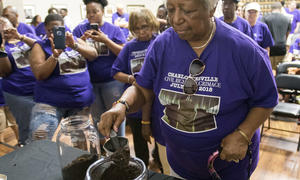1,245 Results
Civics for Democracy in a Time of Transformation and Possibility
In the new Fall 2023 issue of Learning for Justice magazine, Margaret Huang, president and chief executive officer of the Southern Poverty Law Center, emphasizes that, though challenging, this is also a time of great possibility. Huang explains her hopes: “When I look across our movement today, I see so many people of different races, genders, sexual orientations, abilities and backgrounds showing up as allies for one another in the fight for justice and liberation.
- A Time of Transformation and Possibility
- Civics for Democracy
- Fannie Lou Hamer
Teaching Toward Liberation
In our newest Q&A, author and educator Jamilah Pitts shares her thoughts on liberation education and recommendations from her new book, Toward Liberation. Teaching is undeniably difficult, and historically racist educational institutions make it harder. But Pitts offers a vision that leaves space for joy through a teaching practice that is liberatory rather than oppressive.
- Self-Care in the Movement
- Humanity, Healing and Doing the Work
Honoring International Holocaust Remembrance Day
On this International Holocaust Remembrance Day — which marks the 80th anniversary of the 1945 liberation of Auschwitz-Birkenau — we honor the memory of the 6 million Jews and the millions of Roma, Sinti, Slavs, disabled persons, LGBTQ+ individuals, political dissidents and others who were murdered in the Holocaust. The world lost the perspectives and contributions of millions of individuals because of hate.
- Acclaimed Documentary ‘One Survivor Remembers’ Urges All to Never Forget
- Inspiring Hope: A Conversation With Maud Dahme
- ‘Never Again’ Starts With Education
Hostile Opposition to the Civil Rights Movement
Learning Hard History on the Road

New Guide for Gender-Inclusive Puberty and Health Education
